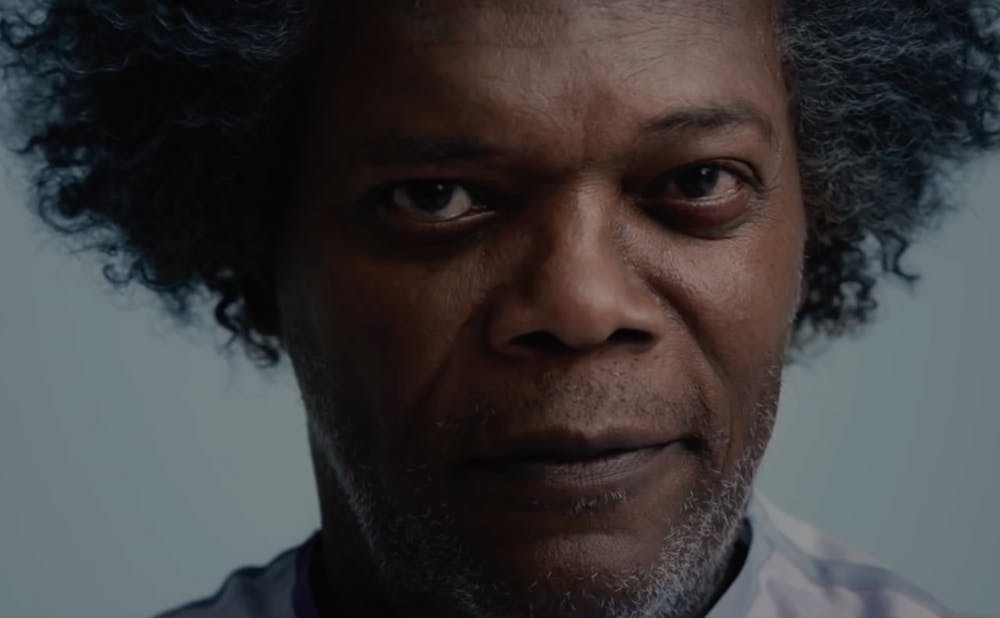“Glass” begins three weeks after the events of “Split.” Kevin Wendell Crumb, the villain of "Split," is still on the loose and wreaking havoc on Philadelphia, abducting young girls and sacrificing them to his 24th dissociated personality, the Beast, in an attempt to show his strength to the world. At the same time, David Dunn, star hero M. Night Shyamalan's 2000 film "Unbreakable," is reintroduced as he tries to hunt down Crumb and achieve justice as the newly named mystery figure, the Overseer. This showdown, two years in the making, comes to an abrupt end when the two are taken into custody by a mental health professional, who specializes in treating people who believe themselves to be superheroes. But are these people really superheroes, or are their powers just figments of their own imaginations?
“Glass” is an entertaining yet underwhelming ending to the "Unbreakable"/"Split" trilogy. Although there are action-packed moments in the film that help redefine the superhero genre, most of the movie feels like an “Unbreakable” rehash. The majority of "Glass" sees Dunn and Crumb questioning their abilities and whether the events they’ve been a part of have been exaggerated in memory. The movie then ends with a classic Shyamalan twist that adds interesting perspective to the film as a whole but ultimately poses more questions than it answers.
The performances of Samuel L. Jackson and James McAvoy in this film are incredible. Jackson reprises his role as the brittle boned mastermind Mr. Glass. Jackson’s performance surpasses his “Unbreakable” performance as he effectively captures both his character’s long-standing love and passion for comics and his growing insanity after years in the mental institution. This passion and insanity complement each other well and stand out in his every scene. McAvoy is also phenomenal as Kevin Wendell Crumb, a man who suffers from dissociative identity disorder and who can take on 24 unique personalities. In “Split," McAvoy only had to tap into eight of these personalities. In this film, he taps into 20, putting a unique spin on each of them. Each personality can be identified by a different voice, posture and facial expression that let the viewer know a new personality has taken over.
The movie leaves a lot to be desired from Willis’s Dunn, particularly for fans of “Unbreakable”. Dunn is hardly in this movie; he appears only at the very beginning and end. The middle of the movie puts so much emphasis on the “bad guys" — Jackson and McAvoy — that we get limited insights into what the hero is thinking or how he is wrestling with the idea that he might not be super after all. The film is frustrating because it feels exclusively like a “Split” sequel rather than a sequel to both “Unbreakable” and “Split.”
Another off-putting piece of this movie was Shyamalan’s filming of the action scenes. There were times during the action sequences in this movie where it was evident that Shyamalan was trying to offer a unique take on the superhero genre through a new camera angle or a more realistic fighting method. Although the intention was clear, the execution was not, as each change he tried to make detracted from the stakes of the fight and what was happening on screen. For example, there are a few action sequences in this movie where Shyamalan mounted a still camera to Willis while he was in a choke hold. It was admirable to try to incorporate this smooth filming tactic to fight scenes that often appear shaky and uncoordinated. However, when executed, the footage just looked awkward: The background and attacker became blurred and the only detailed aspects of the footage was Willis’s face that is locked in a choking expression.
Though entertaining and fun, “Glass” ultimately lacks the execution needed to be a great film. Shyamalan took a lot of risks, including his filming style and the overall plot of the film, and it would be a disservice to not applaud these risks. However, none of the risks he took really amounted to anything. The strong performances of McAvoy and Jackson are not enough to save this film from its rehashed plot and off-putting execution. Despite its name, no one’s expectations were shattered by this film.
Get The Chronicle straight to your inbox
Signup for our weekly newsletter. Cancel at any time.

